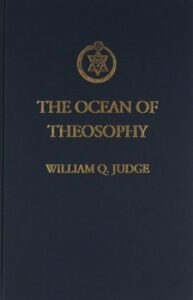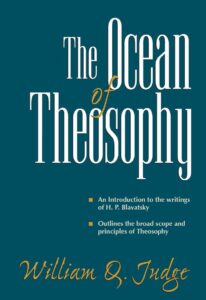Studies in The Ocean of Theosophy Part XVII
Theosophy Magazine
Vol. 22, No.5 March 1934
pages 225 - 228
Part XVII
THE process known as “Reincarnation” is of Cosmic scope; but inasmuch “as man is the most interesting object to himself,” it is considered in detail in its application to Humanity. Chapter ten carries this application to a higher level in its opening statement: “Unless we deny the immortality of man and the existence of soul, there are no sound arguments against the doctrine of pre-existence and re-birth.” This means that denial of Reincarnation is repudiation of all permanency, either of Man or the fruits of his efforts. But even should there be doubt as to a harvest from earth-life, there could be none regarding the potentialities resident in a young child. Let the skeptic answer whence the impulse to stand and walk erect, to speak, and to make merry — saying nothing of the host of more individual characteristics, often setting heredity at naught. The infant, born helpless, within a few short years undertakes many things indicative of experience and practice in past lives.
Similarly, present existence demonstrates re-birth, even “on the dictum of the church that each soul is a new creation.” This would nullify only pre-existence, leaving re-birth still self-evidently necessary, since this soul “must keep on living somewhere after passing away,” in its “proper vesture.” Wherever it goes, it can not be a new creation; then why such insistence that it is a new creation, here and now? Admitting that the soul goes from Earth to some other abode; why is it difficult to conceive that it may have come to Earth from elsewhere — in other words, that it reincarnated here, bringing its capital along, to start a new cycle of enterprise?
Otherwise, the only alternative is to sacrifice the idea of immortality, as Mr. Judge suggests, and regard Man as the whim of a creator — fleeting, vain, hailing from nowhere, going nowhere, here for no purpose, then gone forever. No accounting for native abilities and the thirst for knowledge, save as tantalizers! All Science’s reason for research would then go glimmering, along with Religion’s hope for heavenly bliss. Mankind would have no more meaning than cloud-shapes drifting in a summer sky, formed by the winds, dissipated by their counter-currents. Then let thinkers choose between this emptiness, the one-ended eternity of the church, and growth through repeated lives of experience. Which appeals to both mind and heart?
Well does the heart speak otherwise than that life is vain and purposeless! Formulated or not, each feels the ebb and flow of Being’s ceaseless tides; of which the flood quickens aspiration and perhaps brings success; and its ebb-tide, carrying away opportunity, sometimes leaves wreckage on the sands. Yet, the up-wellings of hope and courage give inward assurance that the tide will again roll in, bringing new chance to the eternal Voyager. The “soul’s immortality — believed in by the mass of humanity — demands embodiment here or elsewhere, and to be embodied means reincarnation.” And Reincarnation is but another term for Eternal Opportunity.
The story of the Ego’s spiral journey, cycle by cycle, through duration, is proclaimed on every hand. It is not necessary to search far afield for material evidence of it. Attention to the motions of one’s own consciousness, checked by observation of human affairs in general, bears sufficient witness of this inherent process of Evolution. For instance, the inherency of the sense of justice shows that justice should obtain throughout the whole of manifestation. Any teaching that fails to satisfy this must be false. What, then, of teachings based on the idea of a single existence? First, consider how each “human being has a definite character different from every other” and as likely to present obstacles as advantages: would arbitrary bestowals of a variety of characters on helpless recipients be compatible with justice? On the contrary, if the “essential nature” is the result of the man’s own choices, it represents complete justice, which is mercy itself.
In the same way, the “vast disparity among men in respect to capacity compels us, if we wish to ascribe justice to Nature or to God, to admit reincarnation and to trace the origin of the disparity back to the past lives of the Ego. For people are as much hindered and handicapped, abused and made the victims of seeming injustice because of limited capacity, as they are by reason of circumstances of birth or education.”
Again, there is the “varied experience possible for man”; and this “scale of variety in experience is enormous.” What of the “vast range of powers latent in man which we see may be developed if opportunity be given,” and the innumerable evidences of mighty accomplishments “intended by Nature to say nothing of what man himself desires to do”? Would it be just that high aspiration should fail satisfaction for lack of time to reach up to its measure; or that “the great troop of passions and desires, selfish motives and ambitions,” “pursuing us even to the door of death,” should remain victors? For realization of our best and the conquering of our worst: “One life is not enough for all this. To say that we have but one life here with such possibilities put before us and impossible of development is to make the universe and life a huge and cruel joke” and to brand the mythical God as a fiend, “triumphing and playing with puny man just because that man is small and the creature of the Almighty.”
The time aspect of this subject presents other interesting angles, such as the large part of a lifetime spent in sleep, in childhood, in the necessary care of the body, and in struggle for livelihood; so that we “see many truths vaguely which a life gives us no time to grasp.” In creatures of but a few years, it were fairer to be started mature, since childhood, sweet though it be, is not a period of accomplishment. And what of sleep, if we were strictly earth entities? This familiar cyclic experience involves the mystery of other planes of being, and dreams furnish evidence of probable conscious action on those planes, during our oblivion to the physical. How could this be, if Man’s connection were solely here! Failing the lessons offered daily in these natural matters, Humanity lives at odds with itself, sensing superior powers, while recognizing that its “faculties are small or dwarfed or weak.” But brooding on such things brings “much more than a suspicion that the extent of the field of truth is vastly greater than the narrow circle we are confined to.” This broader, happier view is confirmed by the doctrine of Reincarnation, with its assurance of amplitude of time to accomplish “what Nature evidently has in view.”
Still another fact to be accounted for is the “immense force” exhibited, oftentimes, permitting inhibiting “circumstances of family and training” to be transcended; or causing men with “small actual brain force” to triumph over this obstacle by the power of their more developed Egoic force. The opposite of this is shown in cases where splendid opportunities can not be availed of because this inner force is lacking; just as a “fiddler” remains a mere fiddler, with the finest violin in his hands. But an artist can draw melodies, albeit less dulcet in tone, from an old, battered “fiddle.” Now all this force must have been evolved, at some time, in some place. “These, Theosophy says, are this earth and the whole period during which the human race has been on the planet.” It “applies to the self — the thinker — the same laws which are seen everywhere in operation throughout nature, and those are all varieties of the great law that effects follow causes.” Thus, mental attachment to this planet will bring the Thinker into reembodiment here, “until such time as the mind is able to overcome the forces which chain it to this globe.”
But greatest of all evidences, stands personal Identity, changeless throughout changes and “which bridges over not only the gaps made by sleep but also those sometimes supervening on temporary lesions of the brain. This identity never breaks from beginning to end of life in the normal person.” It is the “I,” independent of memory, testimony of the senses, or any other thing; so that every man “feels and knows that he has an individuality of his own.” And “only the persistence and eternal character of the soul will account for it.” This Eternal, employing transient bodies, can fulfill his purposes here only by a series of embodiments or Reincarnation.
Conviction that Life holds a definite purpose, and longing to attain this, spring from the spiritual Presence indwelling. They are the language of the Soul. The vast discrepancy between this innate desire and the possibilities afforded in one existence is presumed to be covered by Religion in its teaching of illumination at death. For the deeply earnest, however, Reincarnation is the “only solution.” “We come back to earth because on it and with the beings upon it our deeds were performed; because it is the only proper place where punishment and reward can be justly meted out; because here is the only natural spot in which to continue the struggle toward perfection, toward the development of the faculties we have and the destruction of the wickedness in us.”
Long has Mankind puzzled over the problem of existence, so that to most, perhaps, it now seems a riddle. Facts of common experience, like waking and sleeping, birth and inevitable death, are seldom seen in their real significance. Generations have come and gone, hopelessly asking the same questions: whence, whither, why, how? in relation to themselves. But all too often, men forget to ask What am I? The personal being will struggle in vain, until he considers the Eternal Man. The purpose of life must ever remain an unknown quantity, until Self-knowledge is sought. Theosophy, the Mathematics of the Soul, offers the key in Reincarnation. Once grant it and its corollary, Karma, and there naturally follows regard for who or what returns to birth, and why it so returns — the first steps toward Soul realization.
Back to The Ocean of Theosophy



